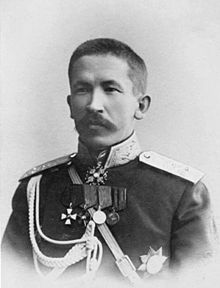Lawr Georgievich Kornilov
Lavr Kornilov ( Russian Лавр Георгиевич Корнилов ., Scientific transliteration Lavr Kornilov Georgievic * August 18 jul. / Thirtieth August 1870 greg. In Ust-Kamenogorsk , General Turkestan , Russian empire , now Öskemen, Kazakhstan , † March 31 jul . / 13. April 1918 greg. in Yekaterinodar ) was a general of the Russian army , which mainly by its coup against the provisional government under Kerensky became known in 1917.
Life
Kornilov was born into a Cossack family of officers and spent his childhood in Kazakhstan . At the age of 13 he joined the Omsk Cadet Corps. From 1889 to 1892 he attended the artillery school in Saint Petersburg , temporarily served in Turkestan and from 1895 to 1897 attended the Academy of the General Staff , which he graduated with honors. Assigned to the staff of the Turkestan Military District, he led several expeditions to East Turkestan, Afghanistan , Persia , India and Mongolia from 1899 to 1904 . In the Russo-Japanese War 1904/05 he served on the staff of a rifle brigade and was promoted to colonel. From 1907 to 1911 he was a military attaché in the Chinese Empire .
As a major general, he commanded at the start of the First World War, the 48th Infantry Division of the 8th Army under General Brusilov . Deployed as part of the XXIV Corps , his division took part in the Battle of Galicia in September 1914 and in the Battle of the Carpathians in the winter of 1915 . As a result of the breakthrough of the Central Powers in the Battle of Gorlice-Tarnow in May 1915, Kornilov was captured by the Austrians , but was able to escape from captivity in July 1916 and escape behind his own lines. For this he was awarded the Russian Order of St. George III. Class excellent.
After the February Revolution he was given command of the Petrograd Military District, and in this capacity on 8 July. / March 21, 1917 greg. the royal family in Tsarskoye Selo under arrest. When riots broke out in the capital in April, he unsuccessfully asked the government for permission to use the military. Thereupon he gave up his post and returned to the front. On 29 April 1917 he took over the command of the room Stanislau standing 8th Army . In July 1917 he was appointed by Minister of War Kerensky after the failure of the summer offensive as commander of the Southwest Front and after his assumption of government as the successor of Brusilov as supreme commander of the Russian troops.
As commander in chief, Kornilov was confronted with the war weariness in the army and in the Russian population. The army and the state as a whole threatened to collapse under the weight of the war. However, Kornilov was determined to continue the war. When he was appointed, he had placed two conditions on Kerensky: no interference by the political leadership in military affairs and full restoration of military discipline.
As a result of the Juliet uprising by left groups, Kornilov was tasked by Kerensky with sending reliable troops near the capital. Kornilov, who saw the decisive threat to Russia in the left and in the workers 'and soldiers' councils , was ready to take offensive action against the Bolsheviks and, after being influenced by the former minister Vladimir Lvov , demanded from the end of August / beginning of September Kerensky dictatorial powers. Whether Kornilov wanted to take action against the Provisional Government and set up a military dictatorship is a matter of dispute.
In any case, Kerensky put Kornilov on August 27th July. / September 9, 1917 greg. from. Kornilov refused to give up his authority and appealed to the people of Petersburg to follow him against the councils and the Provisional Government. However, Kornilov's attempted coup was unsuccessful because the majority of the population did not support it. Kornilov himself was arrested.
After the Bolsheviks seized power in the October Revolution of 1917, Kornilov was released on Duchonin's orders and fled to Novocherkassk in the Don region , where he worked with the former commander-in-chief, General Alexejew, to build up the volunteer army , whose command he assumed. Kornilov publicly advocated terror as a means of warfare for whites in the Russian Civil War : "Even if we burn half of Russia and shed the blood of three-quarters of the population, we will do it if it is necessary to save Russia." During the siege of Ekaterinodar in April 1918, he was fatally wounded when a shell hit his headquarters .
His body was exhumed by the Bolsheviks after the battle, displayed in Ekaterinodar and then burned in a rubbish dump.
literature
- Alexander Fjodorowitsch Kerensky : The prelude to bolshevism. The Kornilov rebellion. Unwin, London 1919. Reprint: Haskell House, New York NY 1972; ISBN 0-8383-1422-8 (representation of his opponent's point of view).
Web links
Individual evidence
- ^ Quote from Kornilov from Orlando Figes: The tragedy of a people ; Berlin, 1998; P. 593
| personal data | |
|---|---|
| SURNAME | Kornilov, Lavr Georgievich |
| ALTERNATIVE NAMES | Lavr Georgievič Kornilov |
| BRIEF DESCRIPTION | Russian general, put a coup against the Kerensky Provisional Government in 1917 |
| DATE OF BIRTH | August 30, 1870 |
| PLACE OF BIRTH | Ust-Kamenogorsk |
| DATE OF DEATH | April 13, 1918 |
| Place of death | Ekaterinodar |
